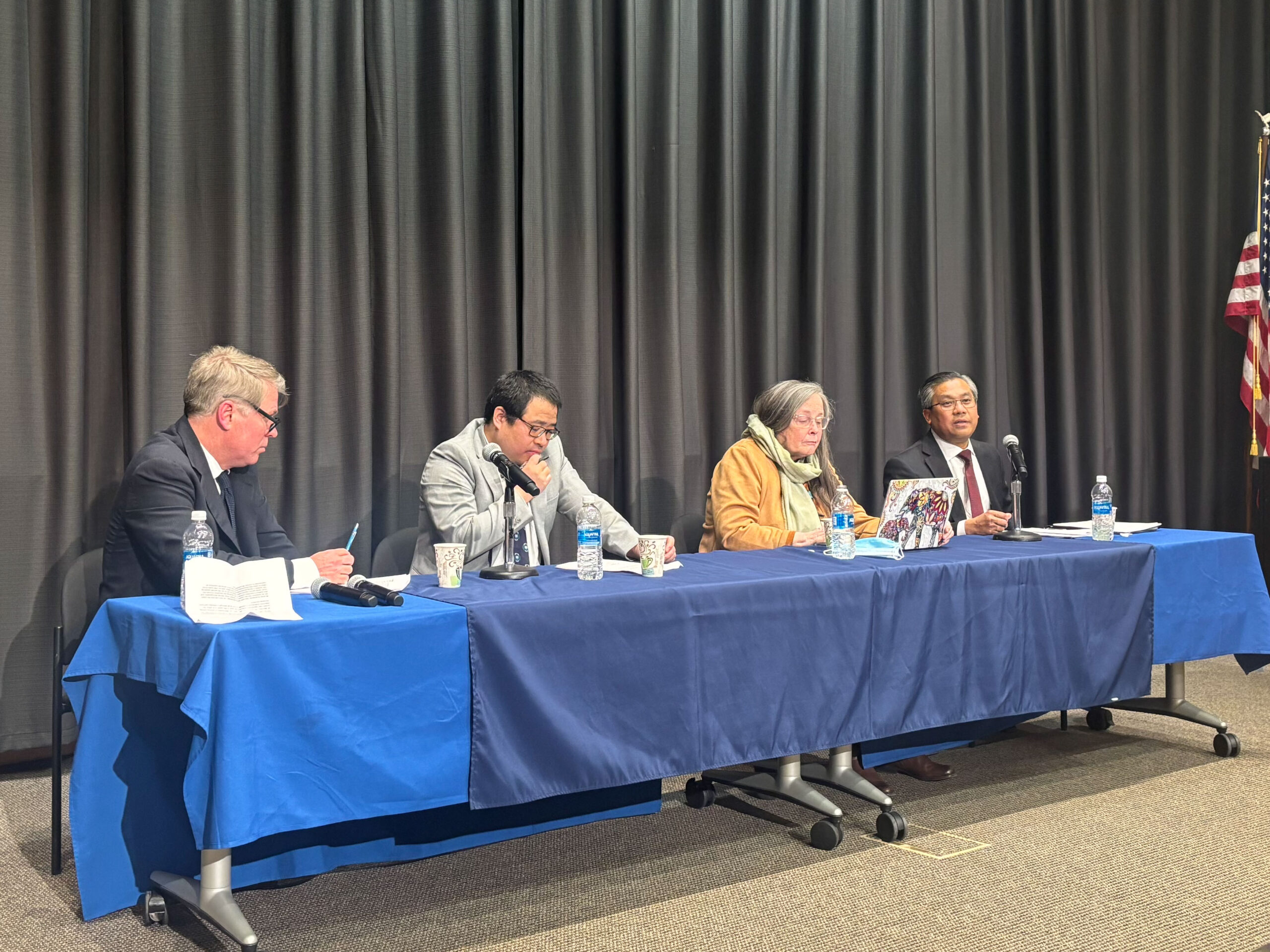Myanmar’s U.N. representative calls for stronger global support for resistance movement
Kyaw Moe Tun presented a lecture about the resistance against Myanmar’s military junta, which gained power in 2021 and has held it since. A subsequent panel discussed what could happen the morning after the resistance prevails.

Jaeha Jang, Contributing Photographer
Kyaw Moe Tun, the permanent representative of Myanmar to the United Nations, visited the MacMillan Center on Friday to discuss Myanmar’s 2021 military coup, subsequent resistance and the nation’s political future.
Following the lecture, a panel of experts on Southeast Asia delved into topics such as the popular support for the resistance and Myanmar’s post-military-rule governance. About 50 people attended the lecture in Luce Hall.
Since the military seized power in February 2021 to stop the endorsement of Myanmar’s 2020 election results, pro-democracy forces have formed a rebel army and led the Civil Disobedience Movement, supported by millions of citizens. While the military regime has attempted to remove Tun, who was appointed in 2020 by the civilian government, from his post, he has remained in his position.
“I think the event was an important dialogue that demonstrated a firm commitment to fighting oppression among shared yet disparate lines of interest while also demonstrating important differences in opinion post-revolution,” said William Trinh ’28, who attended the lecture.
Tun initially highlighted the “tremendous suffering” of Myanmar’s people during the four years following the coup. These acts of violence have included political arrests, the displacement of over 3.5 million people, the collapse of public services, mass killings of civilians and torture.
According to the U.N. Human Rights Office, at least 5,350 civilians have been killed by the military junta.
“Every day is miserable,” Tun said as he held back tears.
However, he said, the resistance has been strong, and the “people’s revolution,” supported by millions, is moving in the right direction to end military rule.
He also said there should be more action from the U.N., which has passed resolutions that call for the end of violence yet lack the power of enforcement.
While the Association of Southeast Asian Nations, or ASEAN, has passed the Five-Point Consensus, he said it has made “no real progress” and “it is obvious ASEAN alone cannot find a sustainable solution on the crisis of Myanmar.”
Vittal Sivakumar ’27, who attended the event, said he thinks the lack of international attention on Myanmar stems from a lack of empathy.
“There’s a perception that it doesn’t affect us directly,” he said. “Apathy is a lot easier when you’re an ocean away from the violence.”
Trinh believes this lack of interest may be due to factors such as fatigue, Southeast Asia being overlooked as a region, or “just the other million messes going on through the world.”
Tun listed four ways the international community can help the people of Myanmar today: helping them build the capability to end military dictatorship, providing humanitarian aid to those in need, weakening the military’s ability to commit further atrocities and rejecting the junta’s attempts to gain legitimacy through sham elections.
“We want all our partners and supporters to be part of the solution,” he said. “Peace and justice must prevail.”
A subsequent panel focused on the post-revolution future of Myanmar, a nation that will have to face the question of incorporating ethnic minorities into the government and address tensions surrounding citizens who didn’t participate in the resistance’s Civil Disobedience Movement.
According to David Thang Moe, a postdoctoral associate and lecturer in Southeast Asian Studies, the military knows “they are not winning this movement,” but they do not want to give up their power.
He added that the resistance to the coup has brought solidarity among diverse ethnic and religious groups and hinted at a federalist government that incorporates ethnic minorities.
“After this coup, people from different ethnic and different religious groups came together, and they apologized to one another, and they showed this inter-religious and inter-ethnic solidarity with one another,” said Moe, who is from an ethnic minority in Myanmar. “These can bring us to the future of an inclusive society in Myanmar.”
Tun added that while those who supported the military junta will have to be banished, “transitional justice” towards the “watermelons,” who secretly supported the resistance while working with the junta, as well as those who were passive in the Civil Disobedience Movement, is more nuanced.
He emphasized the importance of approaching this process with an “open heart.”
“I do understand at this moment, even myself, that emotion is so high because if all of them were with us, the revolution would definitely end right away,” he said. “At the same time, we are always promoting human rights standards. Please don’t forget that we are working for the enjoyment of human rights for everyone.”
Trinh said that discussions of decentralized grassroots resistance and post-resistance governance are also relevant when thinking about conflicts in other Southeast Asian countries and Palestine.
He added that the people’s power demonstrated in Myanmar’s resistance, despite lacking weapons and arms, highlights that “liberation has a power no apartheid or military dictatorship has.”
Saturday marked the fourth anniversary of the coup.
Correction, Feb. 5: The article has been updated to reflect that Tun said that ASEAN has made “no real progress,” correcting an earlier misrepresentation.







